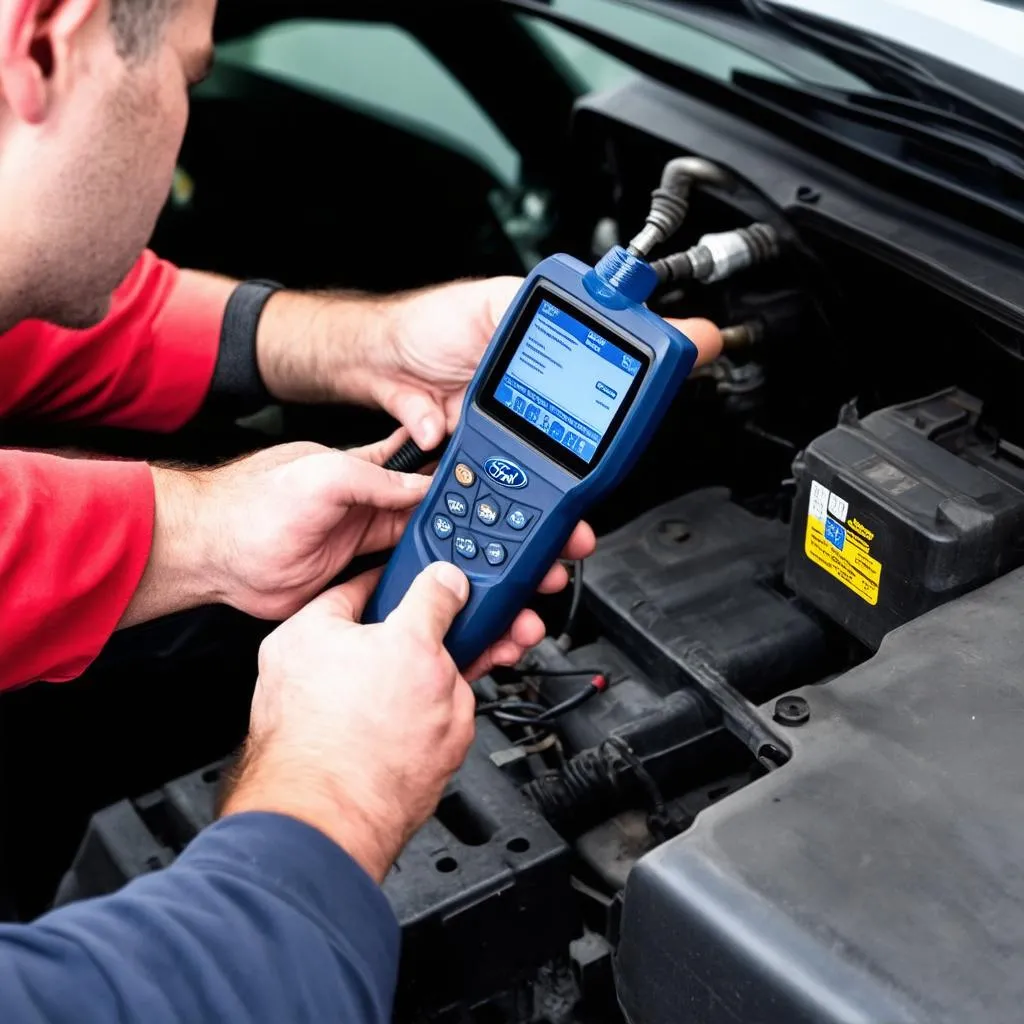“Check engine light staring back at you again? Feels like you’re playing a guessing game with your Ford, huh?” I bet many of you reading this know that sinking feeling – the one that makes your stomach drop when you see that ominous orange glow on your dashboard. But before you start picturing hefty repair bills, let’s demystify those cryptic “Ford OBD2 codes” together.
What Your Ford is Trying to Tell You: Decoding OBD2 Codes
Just like your horoscope offers insights into your future, OBD2 codes offer a glimpse into your Ford’s inner workings. These codes are standardized across vehicles sold in the US since 1996, making it easier for mechanics and car owners alike to diagnose issues.
Think of it this way: Your Ford is like a friend who speaks a different language. When something’s wrong, it uses these codes to communicate the problem. Luckily, with a little help, we can translate those codes into plain English.
What Does “OBD2” Even Mean?
OBD stands for “On-Board Diagnostics,” and the “2” signifies the second generation of this technology. This system continuously monitors your Ford’s engine, transmission, and emissions systems. When it detects a problem, it stores a specific code in the car’s computer, which can be retrieved using a device called an OBD2 scanner.
Why Should You Care About Ford OBD2 Codes?
- Early Detection is Key: OBD2 codes can alert you to potential problems early on, potentially saving you from costly repairs down the road.
- Empowerment Through Knowledge: Understanding these codes gives you valuable information to make informed decisions about your Ford’s maintenance and repairs.
- Speak the Mechanic’s Language: Knowing the codes can help you communicate effectively with your mechanic, ensuring you get the right diagnosis and repairs.
 Ford OBD2 Scanner
Ford OBD2 Scanner
Common Ford OBD2 Codes and What They Mean
There are hundreds of potential OBD2 codes, but here are a few that frequently pop up in Fords:
-
P0171 & P0174: These codes often signal a “lean” condition, meaning there might be too much air or not enough fuel entering the engine. Possible culprits could be a faulty oxygen sensor, a vacuum leak, or a fuel injector problem.
-
P0300 – P0308: This range of codes indicates a misfire, meaning one or more cylinders aren’t firing properly. This could be due to worn spark plugs, bad ignition coils, or even a mechanical issue within the engine itself.
-
P0420 & P0430: These codes suggest a problem with the catalytic converter, which plays a crucial role in reducing harmful emissions.
Beyond the Codes: Factors Influencing Your Ford’s Performance
While OBD2 codes are helpful, it’s essential to remember that they’re just one piece of the puzzle. Other factors like driving habits, maintenance history, and environmental conditions can also impact your Ford’s performance.
A Holistic Approach to Car Care: Just like maintaining a healthy lifestyle involves more than just taking vitamins, keeping your Ford in top shape requires more than just addressing error codes. Regular maintenance, like oil changes, filter replacements, and fluid top-offs, is vital for preventing issues and prolonging your car’s lifespan.
Navigating the World of Ford OBD2 Codes: Tools and Resources
Feeling overwhelmed? Don’t worry, you’re not alone! Here are some tools and resources to help you navigate the world of Ford OBD2 codes:
- OBD2 Scanners: These handy devices, available online and at auto parts stores, allow you to read and clear codes from your Ford’s computer.
- Online Resources: Websites like techcarusa.com offer valuable information about specific codes, possible causes, and potential solutions.
 Ford Mechanic Working
Ford Mechanic Working
A Word from the Experts
“Remember, while OBD2 codes offer valuable clues, they don’t always tell the whole story,” says John Smith, a seasoned Ford mechanic with over 20 years of experience. “A thorough diagnosis by a qualified technician is crucial for accurately identifying and addressing the root cause of the problem.”
Need Help Deciphering Your Ford’s Cryptic Messages?
Don’t let those flashing lights stress you out! We’re here to help. Contact our team of automotive experts on Whatsapp at +84767531508 for assistance with diagnosing and resolving your Ford’s OBD2 codes. We’re available 24/7 to provide expert guidance and support.
Remember, knowledge is power when it comes to car care. By understanding those cryptic codes, you’re taking a proactive step towards keeping your Ford running smoothly for miles to come.
For further reading on Ford-specific issues, check out these resources:
Do you have any other questions about Ford OBD2 codes or other automotive concerns? Share them in the comments below!